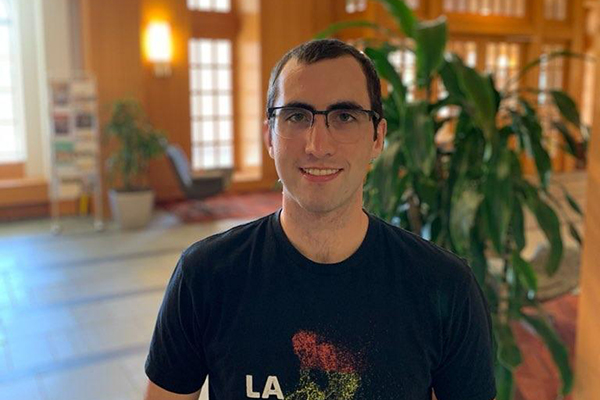EECE doctoral student Czajka receives Department of Energy research award
Jeff Czajka, who works in the lab of Yinjie Tang, will conduct doctoral research at Lawrence Berkeley National Lab for several months in 2021, onsite and/or virtually

Jeffrey Czajka, a fifth-year doctoral student in the Department of Energy, Environmental & Chemical Engineering, has received a research award from the U.S. Department of Energy’s (DOE) Office of Science Graduate Student Research (SCGSR) Program.
The award, given to 52 doctoral students nationwide, allows recipients to conduct part of their doctoral thesis research at a host DOE laboratory in collaboration with a DOE laboratory scientist. Czajka, who works in the lab of Yinjie Tang, professor of energy, environmental & chemical engineering, will conduct his research at Lawrence Berkeley National Lab (LBNL) for several months in 2021, onsite and/or virtually.
Czajka started working in Tang's lab in August 2016 and officially joined the lab in December of that year. He is currently the lab manager and takes care of routine work including student training, lab and shared equipment management and lab safety. He has had the opportunity to work on a variety of projects. His thesis project focuses on characterizing and modeling the metabolism of Yarrowia lipolytica. He has worked with a biotechnology startup company in St. Louis (Arch Innotek) and was part of a team awarded an NSF I-CORPS Site grant and NSF INTERN grant. He recently mentored WashU's iGEM team.
Q: What will you be working on at Lawrence Berkeley National Lab?
A: Scientists and engineers have been trying to reprogram biology to make renewable fuels and chemicals for years, and these efforts have been successful in engineering microbial strains that can produce chemicals in a laboratory at small scales. However, when moving engineered strains from lab to larger, commercial-sized reactors, there is usually a drop in performance; cells start producing less and less of the target chemical, to the point where it is no longer commercially feasible. There are many reasons for this performance drop-off, but it is difficult to determine how they all tie together.
Q: What is the goal of your project?
A: The goal of my project, titled "Omics investigation and machine learning of oleaginous microbial hosts' during biomanufacturing," is to examine molecular measurements obtained, from different omics techniques, through computational modeling and machine-learning techniques to determine what may be the most important factors causing the loss of production. The information gained can help provide insight to developing more robust microbial strains for bio-production. In addition, the models developed during this project may help provide additional ways for scientists to examine omics data.
Q: What are you most looking forward to:
A: Working at the Lawrence Berkeley National Laboratory will be quite exciting for me because they have state-of-the-art facilities and world-class scientists and experts. My project would not have been possible without the sponsorship of Aindrila Mukhopadhyay at LBNL and my McKelvey Engineering adviser, Yinjie Tang. I am hopeful that I can work onsite, and I am quite excited for the project to begin. I also want to acknowledge the U.S. Department of Energy Office of Science Graduate Student Research Program for providing this funding opportunity and the financial support to work on the project.



